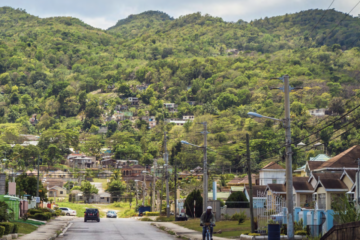Political commentators have dubbed Jair Bolsonaro, Brazil’s President-elect, to be the ‘Trump of the topics’. Superficially there is some merit in this comparison, both men have enjoyed stoking controversy while rallying against ‘political correctness’ and have surrounded themselves with army generals to cultivate ‘tough guy’ images. Their respective campaign slogans were also similar, although “America First” is somewhat more catchy than “Brazil above all, God above everyone”. More surprising however, is that this comparison is apt also in terms of both men’s views on certain foreign policy issues. During his campaign, following in the footsteps of the US President, Bolsonaro endorsed taking a more hardline stance on China, moving the Brazilian embassy in Israel from Tel Aviv to Jerusalem and as well as threatening to withdraw from the Paris Climate Accords. If such statements are translated into policy once Bolsonaro is in office, they will constitute a drastic shift in Brazil’s foreign policy. However, there are also a number of important factors which are likely to constrain Bolsonaro and limit the extent of a Brazilian foreign policy transformation.
To take relations with China first, Bolsonaro has ruffled feathers in Beijing by his visit to Taiwan in March and his inflammatory rhetoric, such as his statement in October that “China isn’t buying in Brazil. Its buying Brazil”. Bolsonaro’s China-bashing, like that of President Trump, plays well with his supporters, particularly manufacturers worried about competition with Chinese imports. It is also motivated by a desire to abandon Brazil’s tradition of neutrality towards the political systems of countries with which it interacts. For example, in March Bolsonaro tweeted that his visits to “Israel, the United States, Japan, South Korea and Taiwan” demonstrated that he would reverse policies of his predecessors who were “friendly with communist regimes.” This hostility towards left-wing governments is also manifested in his tough criticism of Venezuela and Cuba. In contrast with these countries however, China has been Brazil’s largest trading partner since 2009 and is also an important source of investment. A confrontational stance towards the Asian giant therefore, would likely incur significant economic costs on the Brazilian economy which is only just emerging from a severe recession. Indeed, it appears that Bolsonaro has recognised this, in a November meeting with the Chinese Ambassador to Brazil he changed tack by hailing China as “a great cooperation partner”.
Aside from China, Bolsonaro also angered a number of Arab states by announcing in November that, following the US and Guatemala, he plans to move Brazil’s embassy in Israel from Tel Aviv to Jerusalem. Should Brazil commit to the embassy move, which would please Bolsonaro’s evangelical supporters as well as the US, this would undo decades of strong Brazilian support for a two-state solution for the Israel-Palestine conflict. However, the move carries significant costs which could prevent it from being implemented. International opinion remains heavily against a recognition of Jerusalem as the capital of Israel and therefore, the move would carry huge reputational risks for Brazil. It would also threaten political and economic relations with Arab countries. Egypt for example, in a sign of its displeasure postponed an official visit by Brazil’s Minister for Foreign Affairs almost immediately after Bolsonaro’s announcement. Furthermore, Brazilian meat exporters have publicly warned that they could lose an important export market as a result of the embassy move. As of now, Bolsonaro is still publicly committed to the move but this could change as pressure continues to mount on Brazil.

A final foreign policy position Bolsonaro shares with President Trump is his dislike of the Paris Climate Accords, which the US announced it would unilaterally withdraw from in 2017. To the relief of many, Bolsonaro has backtracked from previous threats that he would pull Brazil out of the deal. It appears that the domestic opposition and damage to Brazil’s international standing that such a move would provoke was too great to justify a withdrawal. Nevertheless, in November Brazil’s outgoing Foreign Ministry announced that Brazil would not be hosting important 2019 UN climate talks as planned. Evidently, this suggests that the environment will no longer be an issue internationally championed by Brazil, to the detriment of its reputation. Given the fact that Brazil is home to the largest rainforest on the planet, this is a symbolic as well as a literal blow for environmental advocates.
Aside from the economic and reputational factors which are likely to constrain Bolsonaro’s foreign policy, there are two additional elements which also could have a moderating impact. The first is the presence of moderates within Bolsonaro’s future administration who will attempt to balance against the Trumpian foreign policy instincts of the President-Elect and his Minister for Foreign Affairs Ernesto Araújo. For example, the Vice President-Elect General Hamilton Mourão, recently cautioned that “Brazilian foreign policy has traditionally been pragmatic. We have to keep a balance”. The second element is that once in office, Bolsonaro will have to play to an international audience as well as a domestic one and therefore, his foreign policy should, in theory, be driven less by what is popular with his base. That said, changes in Brazilian foreign policy remain extremely likely. What is less certain is whether such changes will merely tweak or transform Brazil’s foreign policy.


